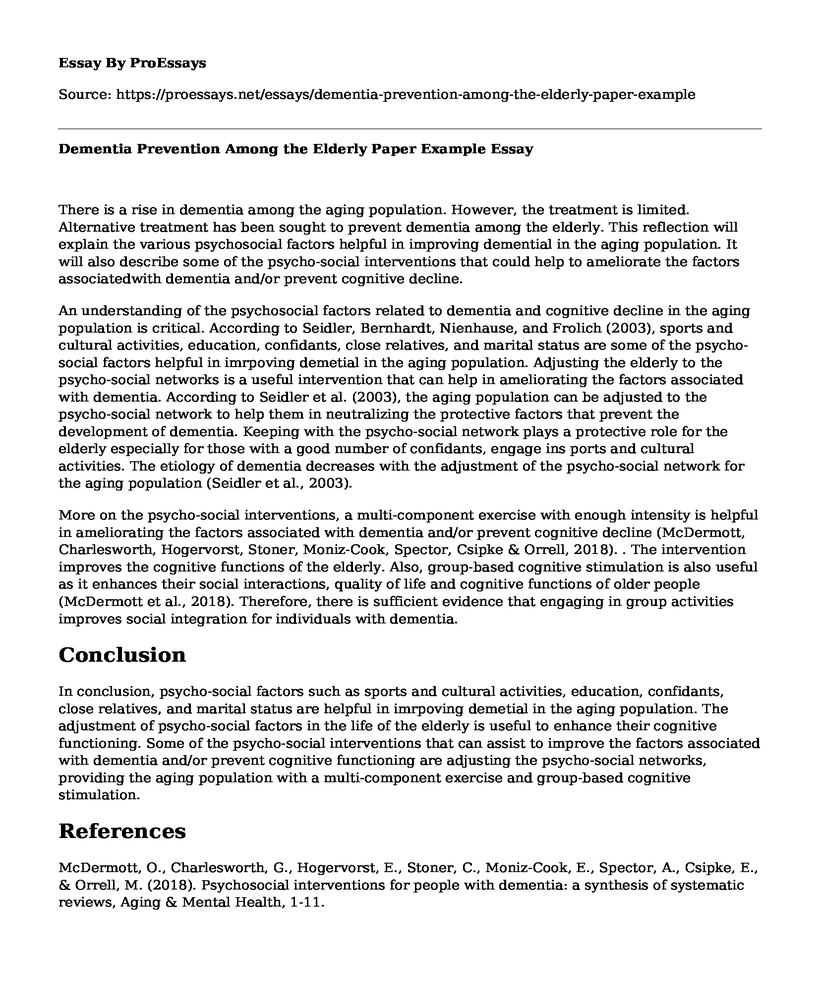There is a rise in dementia among the aging population. However, the treatment is limited. Alternative treatment has been sought to prevent dementia among the elderly. This reflection will explain the various psychosocial factors helpful in improving demential in the aging population. It will also describe some of the psycho-social interventions that could help to ameliorate the factors associatedwith dementia and/or prevent cognitive decline.
An understanding of the psychosocial factors related to dementia and cognitive decline in the aging population is critical. According to Seidler, Bernhardt, Nienhause, and Frolich (2003), sports and cultural activities, education, confidants, close relatives, and marital status are some of the psycho-social factors helpful in imrpoving demetial in the aging population. Adjusting the elderly to the psycho-social networks is a useful intervention that can help in ameliorating the factors associated with dementia. According to Seidler et al. (2003), the aging population can be adjusted to the psycho-social network to help them in neutralizing the protective factors that prevent the development of dementia. Keeping with the psycho-social network plays a protective role for the elderly especially for those with a good number of confidants, engage ins ports and cultural activities. The etiology of dementia decreases with the adjustment of the psycho-social network for the aging population (Seidler et al., 2003).
More on the psycho-social interventions, a multi-component exercise with enough intensity is helpful in ameliorating the factors associated with dementia and/or prevent cognitive decline (McDermott, Charlesworth, Hogervorst, Stoner, Moniz-Cook, Spector, Csipke & Orrell, 2018). . The intervention improves the cognitive functions of the elderly. Also, group-based cognitive stimulation is also useful as it enhances their social interactions, quality of life and cognitive functions of older people (McDermott et al., 2018). Therefore, there is sufficient evidence that engaging in group activities improves social integration for individuals with dementia.
Conclusion
In conclusion, psycho-social factors such as sports and cultural activities, education, confidants, close relatives, and marital status are helpful in imrpoving demetial in the aging population. The adjustment of psycho-social factors in the life of the elderly is useful to enhance their cognitive functioning. Some of the psycho-social interventions that can assist to improve the factors associated with dementia and/or prevent cognitive functioning are adjusting the psycho-social networks, providing the aging population with a multi-component exercise and group-based cognitive stimulation.
References
McDermott, O., Charlesworth, G., Hogervorst, E., Stoner, C., Moniz-Cook, E., Spector, A., Csipke, E., & Orrell, M. (2018). Psychosocial interventions for people with dementia: a synthesis of systematic reviews, Aging & Mental Health, 1-11.
Seidler, A., Bernhardt, T., Nienhaus, A., & Frolich, L. (2003). Association between the psychosocial network and dementia: A case-control study. Journal of Psychiatric, 37, 89-98.
Cite this page
Dementia Prevention Among the Elderly Paper Example. (2022, Sep 21). Retrieved from https://proessays.net/essays/dementia-prevention-among-the-elderly-paper-example
If you are the original author of this essay and no longer wish to have it published on the ProEssays website, please click below to request its removal:
- Article Analysis Example: Competition Would Be the Best Solution to Rising Drug Prices
- Sickle Cell Disorder Essay Example
- Adapted Physical Activity for Autism Spectrum Disorders in Childrens Essay Example
- Essay Sample on Psychiatric Mental Health Nursing
- Essay Example on Development: Constancy & Change Across Life
- Essay Sample on Learning from Life: An Unforgettable Experience in Unit
- Suicide Rates - Report Example







